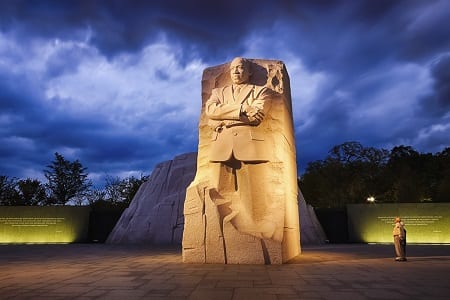 During Black History Month, Americans celebrate and remember Dr. Martin Luther King Jr. on the holiday named after him. Basing his principles on the Scriptures and the heritage of three generations of ministers in his family, King joined other pastors to promote peaceful resistance to the injustice inflicted on African-Americans in the 1960s.
During Black History Month, Americans celebrate and remember Dr. Martin Luther King Jr. on the holiday named after him. Basing his principles on the Scriptures and the heritage of three generations of ministers in his family, King joined other pastors to promote peaceful resistance to the injustice inflicted on African-Americans in the 1960s.
As a pastor and civil rights leader, Dr. King remains a role model for many. The events of spring 1963 that challenged and strengthened his faith illustrate his inspirational example.
Harsh oppression
Though King had advocated nonviolence, Judge W. A. Jenkins issued a blanket injunction against peaceful protest in Alabama, including parading, demonstrating, boycotting, trespassing and picketing. As a result, King was roughly arrested Good Friday, April 12, 1963, while leaving services.
Jonathan Rider, in Gospel of Freedom, muses that in the Birmingham, Alabama, jail, “King was placed alone in a dark cell, with no mattress and denied a phone call. Was [Officer Bull] Connor’s aim, as some thought, to break him?” If so, it was utterly unsuccessful.
One supporter smuggled in an open letter, titled “A Call for Unity,” published by eight white clergyman. They rebuked King as an “outsider” and called on his followers to use the court system rather than protest.
The joint letter objected to King’s timing and his advocacy “against the law.” The same clergymen had authored “An Appeal for Law and Order and Common Sense” earlier that year.
Prisoner’s letter
King’s response became the famous “Letter from Birmingham Jail.” He rejected the “outsider” label and advocated for the unity of all Christians in America. He wrote, “Injustice anywhere is a threat to justice everywhere. We are caught in an inescapable network of mutuality, tied in a single garment of destiny. Whatever affects one directly, affects all indirectly.”
King regretted the tensions caused while condemning businesses for repeatedly breaking promises of color-blind treatment. King’s response to his fellow Christian leaders was simple: without nonviolent direct action, true civil rights would not be achieved.
He reminded his audience of the Biblical precedent for peaceful civil disobedience and of the Founding Fathers’ Boston Tea Party: “It was evidenced sublimely in the refusal of Shadrach, Meshach and Abednego to obey the laws of Nebuchadnezzar, on the ground that a higher moral law [the First Commandment] was at stake.
“The early Christians, who were willing to face hungry lions and the excruciating pain of chopping blocks rather than submit to certain unjust laws of the Roman Empire, practiced it superbly.
“In our own nation, the Boston Tea Party represented a massive act of civil disobedience.”
Even in strong disagreement, however, his tone remained gracious: “I hope this letter finds you strong in the faith. I also hope that circumstances will soon make it possible for me to meet each of you, not as an integrationist or a civil-rights leader but as a fellow clergyman and a Christian brother.
“Let us all hope that the dark clouds of racial prejudice will soon pass away and the deep fog of misunderstanding will be lifted from our fear-drenched communities, and in some not too distant tomorrow the radiant stars of love and brotherhood will shine over our great nation with all their scintillating beauty.”
Continuing needs
The King Center, established by King’s widow Coretta, advocates for his dream. Freedom, justice, and peace are timeless values: so is the principle of peaceful civil disobedience. The King Center (www.thekingcenter.org) is developing a K-12 school curriculum focusing on King’s values with emphasis on nonviolent resistance and service to the disenfranchised.
This encouragement comes at a time when race relations are deteriorating. Youth Pastor Lorenzo Wilder, of the Mount Olive Baptist Church of Delray, cites two examples.
In Miami, Wilder had noted a black-only assembly where students were cajoled to be all that they could be and to excel at school. Wilder questions this strategy: “Why would the blacks in Miami be singled out for pushing to excel? Isn’t that something all students should be encouraged to do?”
Subtle prejudice is not the only discrimination Wilder has seen. Thirty percent of his youth group expressed feelings of being singled out for prejudice because of their color.
Real unity
Recent news events in Ferguson, Missouri, and in New York underscore the need for unity, especially in the body of Messiah. Americans do not often see the damage done by those who would divide Christians by race, class or profession, but it remains rampant.
Jesus greatly prizes unity and prayed that his followers would be one, even as He and His Father in Heaven are one (John 17).
Paul elaborates: “There is neither Jew nor Greek, there is neither bond nor free, there is neither male nor female: for you are all one in Christ Jesus” (Galatians 3:28).
“So we, being many, are one body in Christ, and everyone members one of another” (Romans 12:5).
King stated, “I just want to do God’s will. And he’s allowed me to go to the mountain. And I’ve looked over, and I’ve seen the Promised Land! I may not get there with you, but I want you to know tonight that we as a people will get to the Promised Land.”
The Promised Land that Dr. Martin Luther King Jr. foresaw is also the answer to Jesus’ prayer: unity of purpose among believers. And Jesus’ relationship to the Father assures that his prayer will be answered.
Penni Bulten is a homeschooling mom who is fascinated with the Founding Fathers and their faith. She can be reached at [email protected].

Comments